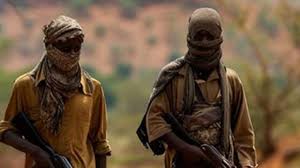By Winifred Momoh

How terrorists from Lukarawa operate in ten council areas in Sokoto, Bauchi.
Before the public learned about Lukarawa’s activities three weeks ago, the new terror group established camps in ten local government areas in the states of Sokoto and Bauchi.
Sources claim that the terror group’s first camps were set up in the villages of Gwanaguano, Mulawa, Wassinya, and Turigaic settlements, which border Nigeria and the Niger Republic.
Eventually, they broke into Nigeria and established camps in various areas, particularly in the Gudu and Tangaza LGAs of Sokoto in 2018.
Credible sources claim that Abu Khadijah, Abdulrahaman (Idi), Dadi Gumba, Muhammad Abu, Usman Shehu, Abu Yusuf, Musa Walia, Ibrahim Suyaka, Ba Sulhu, and Idris Taklakse are a few of the group’s commanders.
Our correspondents discovered that they call their camp Darul Islam and preach in Arabic, Hausa, and Fulfulde.According to a source, they range in age from 18 to 50.
In order to collect taxes, they have been raiding communities in Gudu, Tangaza, Illela, and other local governments; nevertheless, until the most recent Mera attack, they had not killed anyone.A community leader in Tangaza LG stated, “They will count the number of cattle in their custody and compute the tax based on the percentage which they will take from the cattle.
“Dr. Murtala Rufa’i, a researcher at Usmanu Danfodiyo University in Sokoto, disclosed that the group has been preparing to create its caliphate for more than 25 years.He claimed that even though the group’s members had camps spread throughout ten LGAs in the states of Sokoto and Kebbi, they never stayed in one location since they were constantly moving.
They ride motorcycles and are constantly on the go. They can be seen in Bachaka or Kangiwa today, Bachaka Tambo tomorrow, and Bachaka Gudu the next day.
Unless their pathways intersect, this makes it extremely difficult for our security personnel to find them,” the don continued.
He revealed that priests and young people from the Tangaza and Gudu axis, the ancestral homes of the Lukarawa leaders, were among the group’s 1,500–1,800 adherents.According to Rufa’i, the gang was evicted by a group of security officers in 2020, but they reorganized in December 2023.
Since then, Lukarawa’s operations have expanded to roughly 10 local government areas which include Tangaza, Gudu, Illela, Gwadabawa, Kware, Silame, Binji in Sokoto State and Augie and Kangiwa, Argungu, in Kebbi State,” he stated.
The don claims that Lukarawa is a Malian-based group with members from many tribes and religions that is known as Jama’atu Muslimina in the Sahel.
Ahmadu Kofa, whose family were originally Nigerians from a community known as Kofa under the former Kebbi empire, was recognized by him as the group’s leader.
According to Rufa’i, “He hails from Kofa.” His siblings include Umar Kofa and Ibrahim Kofa. Although they currently reside in Mali, their ancestors originated from the Kebbi empire in Nigeria.Balle, the current seat of Gudu LGA of Sokoto, is where their parents and grandparents, including Umar Kofa and Sa’idu Kofa, learned their religion.He added that some of the locals joined Lukarawa because they were hungry and that the group was enticing them with cash, farming supplies, and pumping machines.Rufa’i characterized the group’s members as criminals disguising themselves as religious people.
According to the don, several locals in the impacted areas were scared to notify Lukarawa members because they felt threatened.When they returned, they gathered the locals and informed them that drones would be used to keep an eye on them and their activities. Anyone who attempted to report them was threatened with death.
Thus, the residents live in constant anxiety. They don’t talk about their problem,” he said.According to Mainasara, a resident of Gongono in Tangaza LGA, who described his experience, Lukarawa is present in the area.”A few days ago, one of our youths was kidnapped and killed by the Lukarawa people, who claimed that he had a connection to security personnel,” he stated.But according to the National Counter-Terrorism Centre, Lukarawa had roughly 150 fighters, which is a negligible number.
The Center ascribed the group’s current recruitment campaign to initiatives meant to boost their membership.Major General Adamu Laka, the center’s national coordinator, brushed down concerns about the group’s presence in an interview with reporters in Abuja on Thursday, saying that the threat was not as serious as thought.
Laka promised Nigerians that the Lukarawa group will soon cease to be a security threat due to continuous counterterrorism measures.
Additionally, he warned Nigerians against inciting public panic about the gang.”They have no more than 150 to 200 people in total,” Laka stated. But they want more people to join them, and Nigeria is tough, so that’s why the problem arose.
They are trying to find recruits.He also dismissed concerns that the gang may spread its operations outside of its present site, claiming they lacked the necessary numbers.Laka went on to say that intelligence services were putting in endless effort to provide timely and useful intelligence in order to stop and neutralize the threats the group poses.














